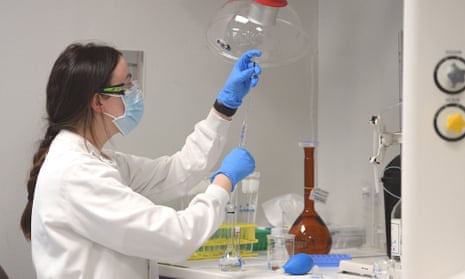Trials of the Oxford coronavirus vaccine may have gathered enough data to show whether it works and is safe by the end of the year – but it will then need to go through the regulatory process, scientists say.
Prof Andrew Pollard, the director of the Oxford Vaccine Group, said it is “just possible” that there may be enough clinical trial data on Oxford University’s Covid-19 vaccine to put before the regulators this year.
Prof Chris Whitty, England’s chief medical officer, has said a vaccine may not be ready until next winter. Pollard suggested they were hoping to go faster.
“I think that Chris Whitty is quite rightly being cautious, that it could take as long as that to first of all demonstrate a vaccine works and is safe and then to go through the processes of regulators looking at that very carefully to make sure everything’s been done correctly,” Pollard told BBC Radio 4’s Today programme.
“But it is also just possible that, if the cases accrue rapidly in the clinical trials, that we could have that data to put before regulators this year, and then there would be a process that they go through in order to make a full assessment of the data.”
That could still mean the vaccine would not be approved this year. The timing is also dependent on trials in countries with high infection rates, so that a clear difference can be seen between those who get the vaccine and those who do not.
“Even with 1,000 people, eventually you’ll have enough information to know whether or not a vaccine works, but that could take years. So, having 20,000 people in our trials already means that that period of time will be shorter, but unfortunately I can’t quite predict the future about how many cases are going to occur.”
Pollard said he hoped that 50,000 people would be involved in the clinical trial for the Oxford University Covid-19 vaccine candidate.
But he stressed that the size of the trial “isn’t really the issue”. What is critical is the number of cases of infection.
“There are a number of trials that we’re running from Oxford here in the UK, in Brazil, and also in South Africa, and the combined size of those three trials together is around about 20,000 people, and AstraZeneca are moving forwards in their trials in the US, hoping to start enrolling 30,000 people.
“So within the trials of the vaccine that was developed here at Oxford University, we’d expect to have perhaps 50,000 or more people in the trials in total.”
He said they would want to have evidence that the vaccine actually works before going to any regulator, including in the US where Donald Trump has said he could seek emergency approval for a vaccine such as the Oxford one in October.
“Emergency use authorisations are well established by regulators both in the United States and in Europe; in fact, you may be aware just this week, the FDA [the US Food and Drug Administration] has granted emergency use authorisation for plasma therapy,” he said.
“So the process of going through emergency use authorisation in an emergency is well established but it still involves having carefully conducted data, just as we are collecting information about the vaccines in clinical trials that are conducted rigorously and evidence that it actually works.
“And so, for our suite of trials that we’re running from Oxford, we would expect to first of all have safety data and then evidence that the vaccine actually works.
“And before anything were to progress from there and of course it’d be AstraZeneca who would then take that forward to regulators.”
AstraZeneca, the pharmaceutical company that is Oxford’s partner in the vaccine development, is separately trialling a new drug that it hopes will prevent and treat Covid-19, with the first volunteers already receiving doses.
The company said the drug, known as AZD7442, is a combination of two monoclonal antibodies.
AstraZeneca said the trial, which will include up to 48 healthy volunteers in the UK aged 18 to 55, will be focused on safety, and the body’s reaction to the drug and how it processes it.
Sir Mene Pangalos, the executive vice-president of biopharmaceuticals research and development at AstraZeneca, said: “This trial is an important milestone in the development of our monoclonal antibody combination to prevent or treat Covid-19.
“This combination of antibodies, coupled to our proprietary half-life extension technology, has the potential to improve both the effectiveness and durability of use, in addition to reducing the likelihood of viral resistance.”
